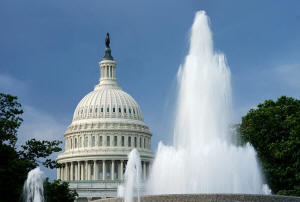US House approves Trump-backed bill on non-citizen voting
 Send a link to a friend
Send a link to a friend
 [July 11, 2024]
By David Morgan [July 11, 2024]
By David Morgan
WASHINGTON (Reuters) -The Republican-controlled U.S. House of
Representatives, fueled by Donald Trump's false claims about election
fraud, approved a bill on Wednesday that would ban non-citizens from
registering to vote in federal elections, a rare practice that is
already illegal.
Less than four months before Trump's Nov. 5 election showdown with
Democratic President Joe Biden, the House voted 221-198 to approval the
measure, which is based on claims that people who have crossed the
U.S.-Mexico border illegally could cast ballots in this year's
presidential and congressional elections.
The legislation now goes to the Democratic-led Senate, where it is
likely to be dead on arrival.
Titled the Safeguard American Voter Eligibility Act, the bill would
require those registering to vote to provide proof of U.S. citizenship
and compel states to purge suspected non-citizens from their voter
rolls.
It is already a felony offense for a non-citizen to vote in a federal
election, and independent studies have shown that such things happen
only rarely.

The bill is opposed by Democrats, who describe it as a voter suppression
effort targeted at key Democratic constituencies with a Trump-inspired
message calculated to undermine overall public confidence in the U.S.
election system.
"This bill would do nothing to safeguard our elections," the White House
said in a statement this week. But it would make it much harder for all
eligible Americans to register to vote and increase the risk that
eligible voters are purged from voter rolls."
Republicans have couched the bill in Trump-like apocalyptic rhetoric.
House Speaker Mike Johnson claimed in a floor speech ahead of the vote
that failure to support the bill would "hand over our country to illegal
aliens, cartel traffickers, and violent criminals and murderers."
Trump, who favors the bill, continues to repeat false claims that the
2020 election was stolen through massive voter fraud.
Johnson, who relied on Trump's support to hold off a bid to oust him
from leadership by Republican hardliner Marjorie Taylor Greene, unveiled
plans for the legislation during an April joint press conference with
the former president in Florida.
[to top of second column]
|

The dome of the U.S. Capitol is seen beyond a fountain in
Washington, U.S., August 12, 2022. REUTERS/Kevin Lamarque/File Photo

Johnson and other Republicans have gone so far as to allege that
Democrats are actively encouraging non-citizens to vote.
"For all the hysterical rhetoric ... Republicans have one real
purpose here: to continue to erode the confidence of Americans in
our election system," said Representative Joe Morelle, top Democrat
on the House Administration Committee, which oversees election
policy.
Johnson and other Republicans have cited data showing non-citizens
are registered to vote in some states and point to municipalities,
including New York City, Washington, D.C., and Montpelier, Vermont,
that have allowed resident aliens to vote in some local elections.
Republicans also rely in part on a widely rejected 2014 study that
claimed to show a level of noncitizen voting capable of swaying
congressional and presidential elections. Trump used the study to
support his claim that Democrat Hillary Clinton won the popular vote
in the 2016 presidential election because of illegal ballots cast by
non-citizens.
"This is a scare tactic," said Wendy Weiser, who directs the
democracy program at the Brennan Center for Justice at New York
University. "Non-citizens cannot vote in U.S. elections. There are
multiple layers of protections in place, including it being a crime
under federal and state law."
A Brennan Center study examined 42 jurisdictions, accounting for
23.5 million votes in the 2016 presidential election, and found only
30 incidents of possible non-citizen voting, or 0.0001% of votes
cast.
(Reporting by David Morgan; Editing by Scott Malone, Christian
Schmollinger and Aurora Ellis)
[© 2024 Thomson Reuters. All rights
reserved.]This material
may not be published, broadcast, rewritten or redistributed.
Thompson Reuters is solely responsible for this content.
 |